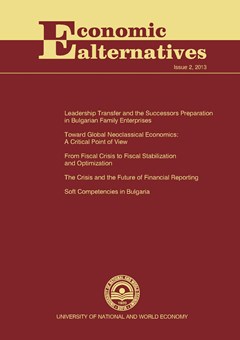From Fiscal Crisis to Fiscal Stabilization and Optimization: the Case of Bulgaria 1998-2012
Author: George Manliev
Abstract
Summary:
The article reveаls the process of fiscal stabilization and optimization following the serious fiscal and economic crisis that Bulgaria experienced in the period between 1996 and 1997. The currency board was introduced and Bulgaria started pursuing fiscal stabilization within the framework of cyclically balanced budget fiscal policy. Fiscal stabilization has been achieved largely due to retaining and rationalizing the budget expenditures in years of economic growth and increasing the tax revenues. Reforms in taxation, budget policy and partly in the social security system and healthcare contributed to the optimization of fiscal balances. Furthermore, the established fiscal rules have created fiscal discipline and supported fiscal stabilization. Due to this type of policy, the country weathered the economic crisis of 2009-2011 without worsening fiscal balances. In 2011 the counry prepared a Fiscal Constitution, but finally adopted the new Public Finance Law, which incorporated a number of fiscal rules, preventing shortterm ineffective discretionary political decisions. As a whole Bulgaria met the fiscal requirements of the Fiscal Pact of the EU (signed 2012), but it is not ready to apply them yet because of the uncertainties surrounding the euro zone. Bulgaria is a suit to follow with regard to successful fiscal stabilization in the last 10 years and reaching fiscal balances contributed to economic growth and the gradual increase of welfare.

